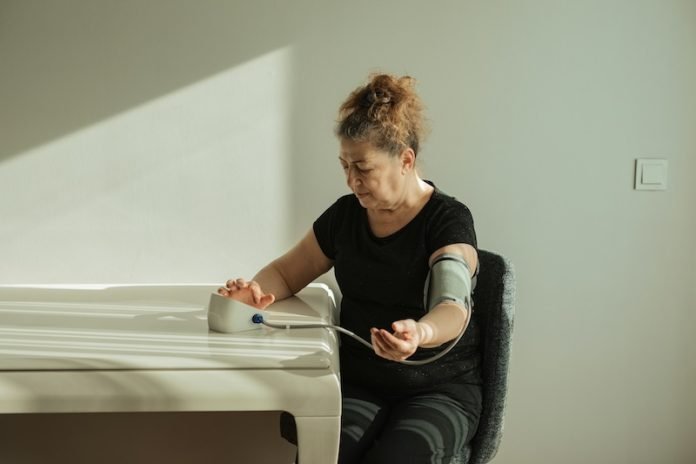
High blood pressure, or hypertension, is a health condition that doesn’t play favorites, especially as we age. For older women, managing this silent ailment requires a delicate balance of lifestyle changes, medication, and regular monitoring.
This guide sheds light on the importance of controlling high blood pressure and how it can be effectively managed without diving into the deep end of medical jargon.
As we age, our bodies go through numerous changes, and our blood vessels are no exception. They tend to become stiffer and less flexible, making it harder for blood to flow through them. This can cause the pressure in these vessels to increase, leading to high blood pressure.
For older women, this condition is particularly concerning because it significantly raises the risk of heart disease, stroke, and kidney problems, which are already more common in post-menopausal women due to changes in hormone levels.
Managing high blood pressure in older women isn’t just about popping pills and hoping for the best. It’s about a comprehensive approach that includes lifestyle adjustments, dietary changes, and, when necessary, medication.
Research has shown that lifestyle interventions, such as regular physical activity and dietary modifications, can have a substantial impact on controlling high blood pressure.
For instance, the DASH (Dietary Approaches to Stop Hypertension) diet, which emphasizes fruits, vegetables, whole grains, and lean proteins while limiting salt, sugar, and saturated fats, has been particularly effective.
Exercise is another cornerstone of managing high blood pressure. Regular physical activity helps the heart become more efficient at pumping blood, which can lower the pressure in the arteries.
For older women, activities like walking, swimming, and yoga can be especially beneficial. These activities are not only gentle on the joints but also contribute to overall well-being and stress reduction, further helping to control blood pressure.
Medication management is also a crucial aspect of controlling high blood pressure in older women. However, it comes with its own set of challenges.
Older adults are more likely to experience side effects from blood pressure medications, which can include dizziness, fatigue, and electrolyte imbalances.
Consequently, doctors often adopt a “start low, go slow” approach to medication in older women, carefully selecting drugs that are effective yet have minimal side effects.
One of the most significant pieces of research evidence supporting the management of high blood pressure in older women comes from large-scale studies that have looked at the outcomes of different treatment strategies.
These studies have found that effectively managing blood pressure can significantly reduce the risk of heart disease and stroke, among other complications.
However, they also emphasize the importance of individualized treatment plans that consider the overall health, potential side effects, and quality of life of the older woman.
In conclusion, managing high blood pressure in older women requires a tailored approach that balances the benefits of treatment with the potential risks and side effects.
Through a combination of lifestyle changes, dietary adjustments, and careful medication management, it is possible to control blood pressure effectively, reducing the risk of heart disease, stroke, and other complications.
The key is regular monitoring and open communication with healthcare providers, ensuring that the treatment plan remains appropriate as the needs and health status of the older woman evolve.
Remember, managing high blood pressure is not just about extending life but improving its quality, allowing older women to enjoy their golden years to the fullest.
If you care about high blood pressure, please read studies about potatoes and high blood pressure, and top 10 choices for a blood pressure-friendly diet
For more information about high blood pressure, please see recent studies about impact of vitamins on high blood pressure you need to know, and the powerful link between high blood pressure and a potassium-rich diet.
Copyright © 2024 Knowridge Science Report. All rights reserved.



